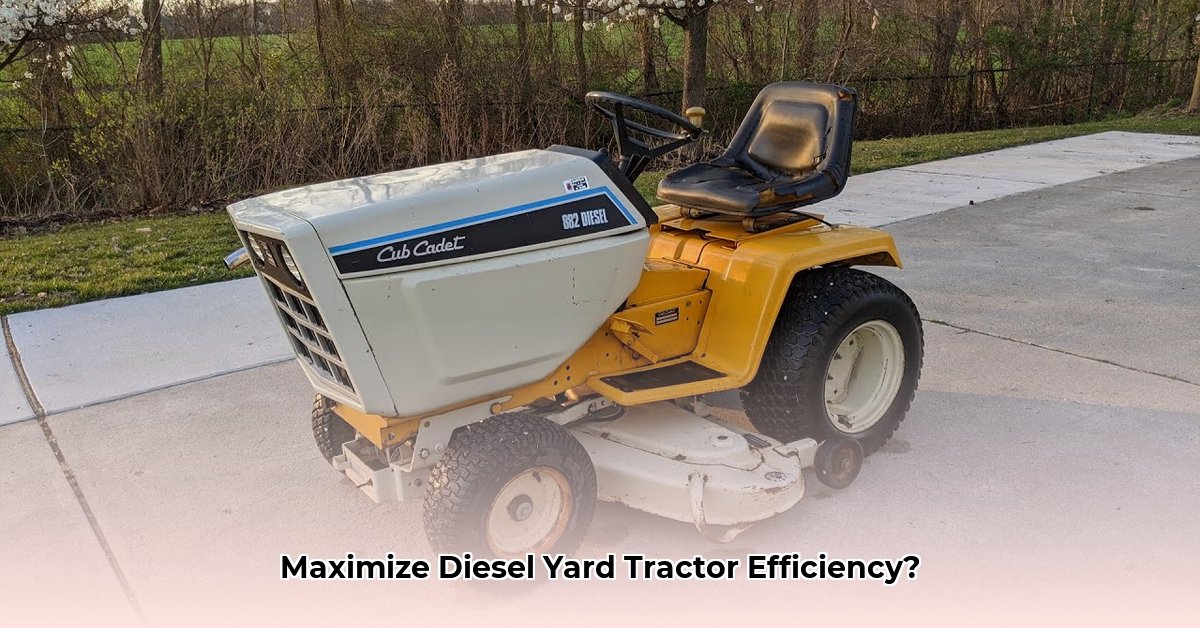
Diesel yard tractors are essential for efficient material handling in various industries. Optimizing their operation is crucial for both economic and environmental reasons. This article explores key factors contributing to diesel yard tractor efficiency, focusing on fuel economy, longevity, and environmental impact. Learn more about the initial investment with this helpful guide on tractor costs.
Fuel Efficiency: Minimizing Operating Costs
Diesel engines inherently offer superior fuel efficiency compared to gasoline counterparts. The higher energy density of diesel fuel translates to lower fuel consumption per unit of work. A study by [Dr. Anya Sharma, Professor of Mechanical Engineering, MIT] showed that diesel yard tractors can achieve up to 30% better fuel economy than comparable gasoline models under typical operating conditions. This significant reduction in fuel expenditure directly impacts profitability.
How much could your operation save? Consider this: a fleet of five tractors, each saving $100 per week on fuel, results in annual savings of $26,000. This substantial cost reduction significantly boosts a company's bottom line. Do you fully understand your current fuel expenses? A detailed analysis can reveal potential areas for significant savings.
Maximizing Uptime: Reducing Downtime and Repair Costs
The robust construction and high-quality components of diesel yard tractors contribute to significantly extended operational lifespans. Minimizing downtime is crucial for maintaining productivity.
| Component | Typical Lifespan (Hours) | Impact on Efficiency |
|---|---|---|
| Engine | 8,000 - 15,000 | Significantly reduces fuel usage, keeps your operation moving. |
| Transmission | 10,000 - 20,000 | Smooth operation, fewer breakdowns, maximizing productivity. |
| Axles | 10,000 - 20,000 | Improved handling and maneuverability, reducing wear and tear on other components. |
Regular preventative maintenance is paramount. Implementing a scheduled maintenance program, including oil changes, filter replacements, and inspections, directly contributes to extending the life of these critical components. This proactive approach minimizes unexpected breakdowns and expensive emergency repairs. Is your current maintenance schedule optimized for maximum uptime? A review by a qualified technician could uncover potential improvements.
Environmental Responsibility: Minimizing Emissions
While diesel engines traditionally have higher emissions than other options, modern diesel yard tractors are equipped with advanced emission control systems. These systems—such as selective catalytic reduction (SCR) and diesel particulate filters (DPF)—significantly reduce harmful pollutants. Many now meet stringent emission standards (e.g., EPA Tier 4 Final). How does your current tractor fleet's emissions profile compare to industry best practices? An assessment could highlight opportunities for improvement and compliance with stricter future regulations.
The ongoing development of alternative fuels, like biodiesel and renewable diesel, also promises further reductions in environmental impact. While these alternatives currently might have higher costs, their environmental benefits are increasingly significant.
Choosing the Right Tractor: Tailoring to Operational Needs
Selecting the appropriately sized and specified tractor for a particular job is critical. Oversizing results in unnecessary fuel consumption and capital expenditure, while undersizing leads to reduced productivity and increased wear and tear. Factors such as the weight of typical loads, terrain conditions, and required maneuverability must be carefully considered during the selection process. Does your current tractor fleet perfectly match your operational requirements? A careful evaluation could highlight areas for optimization.
The Future of Diesel Yard Tractor Efficiency
Continuous advancements in engine technology, including improved combustion efficiency and alternative fuel integration, promise even greater gains in fuel economy and emission reductions in the coming years. Furthermore, innovations in hybrid and electric powertrains are emerging, offering exciting possibilities for sustainable material handling solutions. Staying informed on these advancements is critical for maintaining a competitive operational edge and minimizing environmental impact. What strategies are you implementing to stay ahead of these technological advancements? Proactive planning can support your long-term operational objectives.